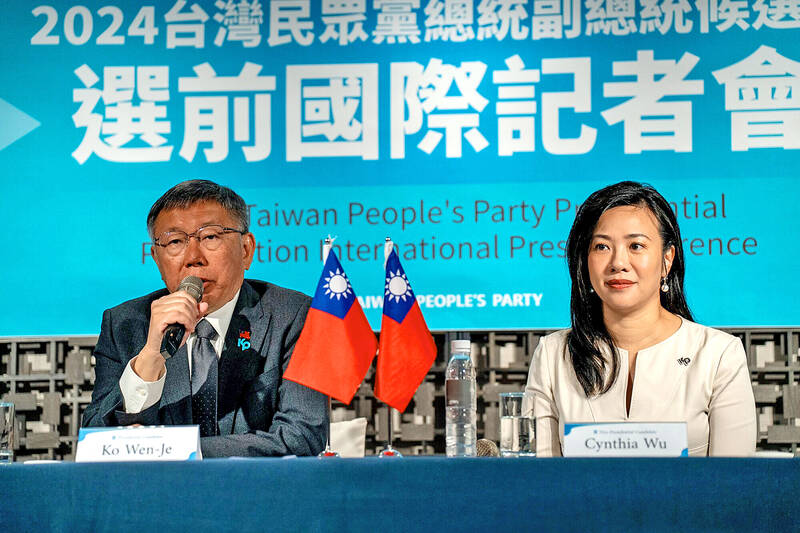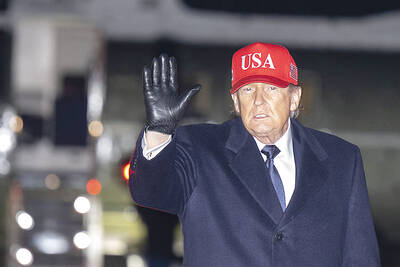Taiwan People’s Party (TPP) Chairman and presidential candidate Ko Wen-je (柯文哲) yesterday said that, if elected, he would first ensure that Taiwan’s relationship with the US remains solid before attempting to open communications with China.
At a press conference, Ko was questioned about strained cross-strait relations and how he would navigate this situation alongside Taiwan’s ties with the US if elected.
Ko said that the US is Taiwan’s most important ally and also the most powerful country in the world.

Photo: Bloomberg
“We will definitely maintain a solid relationship between Taiwan and the US, and on that foundation, we will be open to starting communications with China,” he said at the press event, which was livestreamed on YouTube.
The TPP’s approach would involve prioritizing seamless communications with the US to prevent any unexpected developments, thereby establishing a foundation of mutual trust, he said.
Ko said he would work with Beijing whenever the opportunity for cooperation arises and will compete with China when necessary, as part of his strategy to navigate the tense cross-strait situation.
Ko, a former Taipei mayor who founded the TPP in 2019 and has won a passionate support base, especially among young people by putting issues like the high cost of housing and low wages at the center of his campaign, said Taiwan needs to break the traditional two-party mould to achieve real change.
Repeating one of his talking points on the campaign trail, Ko said the Democratic Progressive Party (DPP) has a “tendency to confront Beijing even in cooperative scenarios,” while the Chinese Nationalist Party (KMT) seeks cooperation with China even when the situation requires confrontation.
“Among the current trio of candidates, Ko Wen-je is the only person who is acceptable to both China and the United States. This is currently my biggest advantage,” he said.
Generally, Taiwan should express its willingness to engage in communications with China, while maintaining a non-negotiable stance on the preservation of its free and democratic political system and way of life, he said.
Ko said that no one should depend solely on the goodwill of another country for security, as part of his response to a CBS reporter’s question on whether he thought he could alter Chinese President Xi Jinping’s (習近平) objective of China’s unification with Taiwan.
“Taiwan must have the capacity to protect itself,” and as such, must prioritize “deterrence and communication” in its policy toward Beijing, Ko said.
“If it comes to a military confrontation, Taiwan will be no match for the mainland,” he said. “However, Taiwan must make it very clear to China that ‘if you choose to engage in conflict, you will have to pay a hefty price,’” he added.
Elaborating on his national defense policies, Ko said he would seek to increase Taiwan’s defense budget to 3 percent of GDP, above the record 2.5 percent the administration of President Tsai Ying-wen (蔡英文) proposed in its 2024 budget.
Additional reporting by Reuters

Taiwan has received more than US$70 million in royalties as of the end of last year from developing the F-16V jet as countries worldwide purchase or upgrade to this popular model, government and military officials said on Saturday. Taiwan funded the development of the F-16V jet and ended up the sole investor as other countries withdrew from the program. Now the F-16V is increasingly popular and countries must pay Taiwan a percentage in royalties when they purchase new F-16V aircraft or upgrade older F-16 models. The next five years are expected to be the peak for these royalties, with Taiwan potentially earning

STAY IN YOUR LANE: As the US and Israel attack Iran, the ministry has warned China not to overstep by including Taiwanese citizens in its evacuation orders The Ministry of Foreign Affairs (MOFA) yesterday rebuked a statement by China’s embassy in Israel that it would evacuate Taiwanese holders of Chinese travel documents from Israel amid the latter’s escalating conflict with Iran. Tensions have risen across the Middle East in the wake of US and Israeli airstrikes on Iran beginning Saturday. China subsequently issued an evacuation notice for its citizens. In a news release, the Chinese embassy in Israel said holders of “Taiwan compatriot permits (台胞證)” issued to Taiwanese nationals by Chinese authorities for travel to China — could register for evacuation to Egypt. In Taipei, the ministry yesterday said Taiwan

‘LIKE-MINDED PARTNER’: Tako van Popta said it would be inappropriate to delay signing the deal with Taiwan because of China, adding he would promote the issue Canadian senators have stressed Taiwan’s importance for international trade and expressed enthusiasm for ensuring the Taiwan-Canada trade cooperation framework agreement is implemented this year. Representative to Canada Harry Tseng (曾厚仁) in an interview with the Central News Agency (CNA) said he was increasingly uneasy about Ottawa’s delays in signing the agreement, especially as Ottawa has warmed toward Beijing. There are “no negotiations left. Not only [is it] initialed, we have three versions of the text ready: English, French and Mandarin,” Tseng said. “That tells you how close we are to the final signature.” Tseng said that he hoped Canadian Prime Minister Mark Carney

The US’ joint strikes with Israel on Iran dismantled a key pillar of China’s regional strategy, removing an important piece in Beijing’s potential Taiwan Strait scenario, said Zineb Riboua, a senior researcher at the Hudson Institute’s Center for Middle East Peace and Security. In an article titled: “The Iran Question Is All About China,” Riboua said that understanding the Iran issue in the context of China’s “grand strategy” is essential to fully grasp the complexity of the situation. Beijing has spent billions of dollars over the years turning Iran into a “structural strategic asset,” diverting US military resources in the